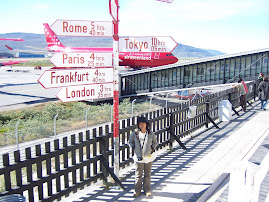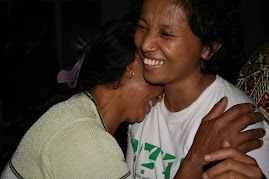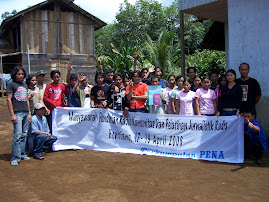[INDONESIA-NEWS] JKTP - Madurese Refugees Ready to Start New Life
From: indonesia-p@indopubs.com
Date: Tue Feb 01 2000 - 16:26:18 MST
X-URL: http://www.thejakartapost.com:8890/iscp_render?menu_name=hitlist_details&id=658259
Madurese refugees ready to start new life
Business News - February 02, 2000
By Erma S. Ranik
PONTIANAK, West Kalimantan (JP): "I do not know when we can start
farming here," Syamsudin, 39, complained. The farmer from Sanggau Ledo
in Sambas regency was one of 500 Madurese refugees from Sambas.
The refugees from last year's ethnic riot pitting Madurese migrants
and indigenous Malays now occupy a resettlement site provided by the
government at Tebang Kacang village, Sui Raya subdistrict,
regency.
Syamsudin's complaint is well founded. He has occupied the house
allocated to him for six months but, like other refugees, cannot yet
start planting. The problem is that they are yet to clear the land
that the government has provided for farming.
Now the refugees depend on government assistance for their basic
necessities, such as rice, kerosene, cooking oil and salted fish. All
this assistance will stop in a few months; after then they will be on
their own. Now they are hard pressed to imagine a future without land
and government aid.
It is also impossible to plant crops on the land within their housing
complex. Lacking a drainage system, their homesteads are often
flooded.
Some refugees whose homes have not flooded have successfully grown
corn. Other refugees are trying something different. "Felling trees in
the forest," said Hasib, a refugee from Karimunting, Sui Raya
subdistrict, Sambas regency. Hasib can earn Rp 15,000 a day from
selling wood. "It helps make ends meet," he said.
Hasib hopes the land is ready for farming so that he can "start a new
life" in the fertile Tebang Kacang. "We want to start farming as soon
as possible."
Tebang Kacang was formerly a densely forested area. The first farmer
to open the land to agriculture many years ago was Asmar H. Ibrahim,
74. Thanks to Asmar's tenacity, Tebang Kacang is now a prosperous
agricultural village.
Tebang Kacang is a main producer of vegetables, ginger and other cash
crops in
another Tebang Kacang resident.
Marketing is no problem because Tebang Kacang is well-connected with
the main city,
cities are two hours apart by boat.
However, life is not easy at Tebang Kacang. Asmar has prohibited
residents from gambling and carrying sharp weapons. "Sharp weapons are
allowed only on the farm," Amat said.
The relocated Madurese migrants displaced by bloody ethnic fighting
between the indigenous Malay and Dayak groups had become everyone's
headache. All districts openly refused to accommodate them except
Tebang Kacang, probably because it was already predominantly Madurese.
The first migrant group arrived there six months ago. At that time,
public facilities such as elementary schools and community health
centers were under construction.
Children's education remains largely neglected -- there are no school
buildings. "Elementary schools are yet to be built," said Subro, a
college student who volunteers to help the displaced Madurese in
Tebang Kacang.
The nearest elementary school to Tebang Kacang is located far from the
resettlement complex across a river. The children are afraid to go
there. To solve the problem, the refugees have established a
foundation to run an Islamic elementary school, Madrasah Ibtidaiyah.
Makeshift shelters formerly used to accommodate the refugees are now
used as classrooms.
The school has a great number of students. "Nearly 250," said
Syamsudin, the Al Muhajirin foundation secretary. The teachers are
self-supporting and recruited from among the refugees.
Health facilities and drinking water are not available. The refugees
rely on the
People collect rainwater for drinking.
In short, life in the resettlement area is chaotic.
Many people are wondering about the Rp 3.6 billion which the
government earmarked for refugees. Refugees said the funds were
allocated for resettlement, clean water and schools, but they believe
that the funds are largely unaccounted for.
"No one should exploit our misery for their own gains," a refugee
said.
---






.jpg)
Tidak ada komentar:
Posting Komentar